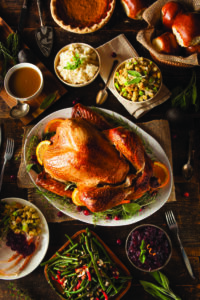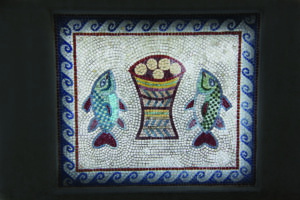
By Summer Stevens
With the holidays—and holiday foods—just around the corner, and everything at a fever pitch, it can be easy to miss the Biblical significance of feasting and how celebrating with food can actually draw us near to the heart of God. Where in the Bible do we see the theological significance of eating?
1. The Garden of Eden. It is fascinating to consider that Adam was created in need. Even before the fall, he needed food. In the first three chapters of Genesis, there are twenty-one references to food and eating! The fibers of mankind’s original story are woven with the sights, smells, and taste of food, which God created specifically for our sustenance and delight. When was the last time you took the time to examine the loveliness and intricacy of an orange or a pomegranate as a reflection of God’s love for beauty? As you prepare your holiday meals, whether it’s a family Christmas feast or a plate of decorated cookies for your neighbor, stop for a moment to thank the Lord for the gift of food that “is pleasant to the sight” (Gen 2:9) and receive it as an expression of His love for you.
2. Fasting. In the OT, God used famine to draw the hearts of the people back to Him. You only have to miss one meal for your thoughts to stray to food. Miss two, and those thoughts are distracting. Miss three, and you’re almost obsessed with finding your next meal. Fasting is significant not only for the need you feel with a growling belly, but I believe it’s also significant when you break your fast and enjoy the sensations of eating and the rejuvenation of your body from food’s nourishment, all of which were thoughtfully designed by our creative God.
3. Feasting. Feasting is a picture of a God of abundance. The Israelites were required to participate in the feasts (participation varied from offering animals for sacrifice to eating specific foods). How many of us see Fourth of July cookouts or Easter dinners as mandatory? No one! But Leviticus 23 records seven feasts that God commanded His people to partake in. Many of the feasts specifically called for fasting before the meal was consumed. The Feast of the Firstfruits required that until the priest made the burnt offering and the grain offering, the Israelites were to “eat neither bread nor grain parched nor fresh until this same day, until you have brought the offering of your God” (Lev 23:14). Giving God the first and best demonstrated trust that He would provide throughout the rest of the harvest, as did enjoying its abundance rather than hoarding it. Simply put, feasting is a way to trust God’s provision, goodness, and ability to sustain us rather than to trust in our own capability.
In today’s culture, we often value frugality to a fault. Our God is a lavish God!
I’m sure it took a lot of faith to feast for seven days (e.g., the Feast of Booths), but it was an act of belief that Yahweh would provide for His people. Though we aren’t required to celebrate with a Thanksgiving or Christmas meal, we can choose to see those meals as expressions of the lavish provision of God.

4. Jesus. In the NT, Jesus takes the concept of abundance and supersizes it. When He fed the five thousand in John 6, the disciples picked up twelve baskets full of leftovers after the people had “eaten their fill” (John 6:12). In His first miracle in Cana, Jesus turned water into wine—equal to one thousand bottles of wine! To go even further, Jesus not only died for our sins, but throughout the Gospels He offers Himself as sustenance for us now. “I am the bread of life: whoever comes to me shall not hunger, and whoever believes in me shall not thirst” (John 6:35). He offers the woman at the well living water that you can drink and “will never thirst again” (John 4:14). At the end of the elaborate Feast of Booths, Jesus stands up and cries, “If anyone thirsts, let
him come to Me and drink” (John 7:37). Jesus is the glorious fulfillment of the abundance of God. In Him there is total satisfaction. As we enjoy the special food and drink the holiday season has to offer, we do it knowing that food is meant for our enjoyment, but ultimately it points to the source of our true desire: the presence of God.
5. The Covenants. God uses food in unique ways throughout Scripture, one of which is often to confirm covenants. God gives the food of the Garden to Adam and Eve. God confirms His covenant with Noah by expanding his food source: “Every moving thing that lives shall be food for you” (Gen 9:3). When God confirms the covenant with the Israelites in Exodus, Moses and the seventy elders of Israel go up and dine with God on a pavement of sapphire stone (Exod 24:10-11). Jesus institutes the New Covenant in His blood, which is His body, of which we are to partake through the Lord’s Supper (1 Cor 11:24). Our first heavenly celebration will be at the Marriage Supper of the Lamb. All throughout Scripture, we see food as a means to mark God’s promises. So let’s enjoy the God-ordained use of food as a means of celebration! And pass the pumpkin spice!
______________________
Summer Stevens is married to Nathanael and they have five children. She has a Master’s in Biblical Studies from Dallas Theological Seminary and enjoys running (but mostly talking) with friends and reading good books to her kids.



